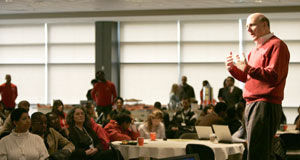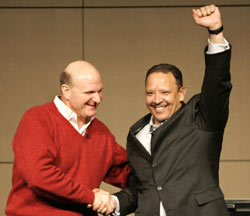REDMOND, Wash., Feb. 2, 2007 — According to U.S. Bureau of Labor Statistics data, the projected number of IT jobs is expected to increase to over 5 million in 2010. However, there has been growing concern about science and mathematics achievement by American high school students — and their ability to fill those jobs, especially compared to their counterparts in other countries. Interest in math and science fields is low, particularly amongst African Americans. According to a study by the Commission on Professionals in Science and Technology, the number of African Americans in the fields of science, engineering, technology and mathematics has decreased, from approximately 11 percent of individuals in the IT field during 1999-2001, to 6 percent, currently.

Steve Ballmer, Microsoft CEO, address a gathering of local minority students participating in the Blacks at Microsoft Minority Student Day activities.
Microsoft has long viewed diversity as a core value and critical to the success of its business. The company is committed to attracting talented women and minorities to pursue careers in technology, and believes that hiring and retaining a workforce with varied experiences and insights enables the company to better serve the wide-ranging needs of its customers and create a competitive advantage in the global marketplace.
In the latest demonstration of the company’s reaching out to extended communities and helping people reach their full potential, Microsoft CEO Steve Ballmer announced a US$5 million software grant to the National Urban League today during a keynote speech at the annual Blacks at Microsoft (BAM) Minority Student Day gathering.
The National Urban League is the oldest and largest community-based movement in the U.S. devoted to empowering African-Americans to enter the economic and social mainstream.
“When we talk about our mission as a company, we talk about helping people and businesses throughout the world realize their potential,” said Ballmer. “And that means all people realize their potential, whether it’s a technologist or user of technology, whether it’s rich people or poor people, whether it’s people in the United States or in less affluent countries, whether it’s white people or people of color, whether it’s men or women,” he said, giving out his e-mail address to the gathering of students.
Visiting Microsoft for the event Friday was Marc Morial, president and CEO of the National Urban League. “People who today don’t know how to operate a computer would have been like someone in 1980 not having any concept of what a telephone was,” Morial said. “They’d be disconnected from the world. Our work with Microsoft will bring technology access to people who might never have had that kind of access — or at least not in as timely a fashion. The computer’s possibilities, its capabilities, make it no longer a nicety, but a necessity, for future success.”
A Shared History of a Passion for Diversity
Microsoft and the National Urban League have historically worked together to achieve a common goal: providing technology access to underserved communities and broadening digital inclusion. Tanya Clemons, Microsoft corporate vice president, People and Organizational Capability, serves on the National Urban League’s board of directors. Microsoft also provides annual sponsorship for the National Urban League’s career fair, and supports the organization’s local affiliates with executive engagement and sponsorships.
“Through various community outreach programs, Microsoft is giving back to the diverse communities in which we live, work and do business,” says Claudette Whiting, general manager for Global Diversity and Inclusion at Microsoft. “Our support of organizations such as the National Urban League enables us to strengthen ties in specific communities and influence youth who will hopefully pursue a career in high technology.”
In 2006, Microsoft and the National Urban League teamed up to support Making the Business: Youth IT Challenge, a 10-week program designed to engage minority boys and girls in the development of an original IT business idea. The program is intended to help students learn team and leadership skills, generate discussion about technology and learn how that technology can be used to create a business. The program also includes lessons for developing presentations and honing communication skills so the students can effectively deliver their business plans during local and national competitions.

Microsoft CEO Ballmer (left) and National Urban League President and CEO Marc Morial announce a $5 million software grant from Microsoft to the Urban League, to be rolled out over three years.
James Kelly, president of the Seattle Urban League, points to Collegedough.com, a nonprofit organization offering resources and information about college and financial aid — formed by the second-place winners of the 2005 Youth IT Challenge — as an example of how the annual contest can transform business ideas into reality. “We live in a global, technological economy,” says Kelly. “Today’s markets are not just Spokane, but Singapore; not just Issaquah, but India. We need to reach kids early because technology is like learning a second language, the earlier you start, the easier it is.”
Today’s Microsoft software grant will be rolled out over three years, providing the National Urban League with tools to integrate data systems and more effectively communicate with Urban League affiliates and their volunteer corps across the nation, and also provide them with the technology system assessments and software needed to enhance the organization’s adult and youth programs, as well as encourage kids to pursue careers related to math and science.
“Technology has allowed us to unleash our imaginations and cross boundaries once thought impossible — however there are segments of our population that can still use a little help,” says Delanda Sydney, product manager, Microsoft BizTalk Server 2006, co-chair of Ways and Means for the Seattle Urban League Young Professional’s executive board, and Microsoft BAM president from 2004-2006. “Our collaboration with the National Urban League will help us develop local solutions that help people achieve their potential through technology.”
Microsoft also has strong partnerships with many other important community organizations through our diversity outreach program. These organizations include the Thurgood Marshall Scholarship Fund, National Council of La Raza, National Center for Women and Information Technology and the United Negro College Fund.
Exploring Careers in Technology
The goal of the BAM Minority Student Day is to provide Seattle-area high-school students from underrepresented ethnic backgrounds with information about the exciting tools, resources and career opportunities available to them in high technology.
During Ballmer’s keynote, demos were shown of Zune, the recently launched Windows Vista, as well as a trailer for the upcoming Xbox 360 game Halo 3, to the delight of the students attending.
When Tony Archibong, Amara Osisioma and Julius Farrington met in spring of 2006 to discuss the theme of this year’s 16th-annual Minority Student Day, they felt it was imperative that the theme really speak to minority high-school students and their options for a technology-based career path. Thus was born the theme of today’s event, Me @ Microsoft!
“It is important to expose minorities to more diverse career options, because these are the students that lack awareness of this field, and tend to lean towards alternative career paths,” explains Archibong, a financial analyst at Microsoft and one of the co-coordinators of BAM Minority Student Day.
Me @ Microsoft! is a theme that also encompasses the diverse backgrounds and distinct career paths of Microsoft employees, and throughout the day, many of them will guide students who share similar interests and passions through hands-on technology labs and information sessions, as well as serve as mentors, talking with students about the wide variety of career opportunities available to them in technology.
“We are very appreciative of the grant that was announced today, but Microsoft gives something more valuable than just money or software,” says Kelly. “Many Microsoft employees serve on Urban League boards and volunteer as technology coaches. We want to thank Microsoft and its employees for the time and caring they give to tomorrow’s future Leaguers.”
In addition to Redmond, six other U.S. cities hosted BAM Minority Student Day activities, including Mountain View, Calif.; Las Colinas, Texas; Atlanta, Ga.; Charlotte, N.C.; New York, N.Y.; and for the first time, Washington, D.C. All told, about 1,000 students and over 200 volunteers participate in today’s events.
“For the students, this is a great opportunity to be exposed to technology in nearly every aspect, and we hope they become a part of the future at Microsoft,” says Sydney. “As a result of the BAM Minority Student Day, we’ve had students apply for our BAM scholarship, hired high school interns, and at times even extended opportunities for full-time positions.”
In addition to Ballmer’s keynote, this year’s BAM Minority Student Day activities include: Employee panels – moderated by Jeff Raikes, president of Microsoft’s Business division, employees of diverse backgrounds and experiences educate the students on different job functions and opportunities at Microsoft; a nonprofit organization (NPO) fair – local NPOs from the community share their vision and tools; Microsoft product fair – employees demo products and provide the students with exposure to a breadth of Microsoft products and the unique opportunities each represents; a tour of Microsoft – students get an inside look at Microsoft and see first hand the people who work at the company and how they deliver products and services; onsite games and projects, which challenge students and instantly spark creative thinking.
Prior to the event, students participated in an essay contest which challenged the students to start thinking about technology and reflect on the impact technology has on their present and future. This year’s winner was Abel Teklai, an 11th-grader from Garfield High School in Seattle who will receive an HP laptop along with software such as the new 2007 Microsoft Office system.
“Diversity and workforce inclusion are key factors in helping define how we do business in today’s marketplace,” says Whiting. “It helps us compete for the best talent and enhance our ability to create new revenue streams, retain employees and maintain our marketplace leadership.”




